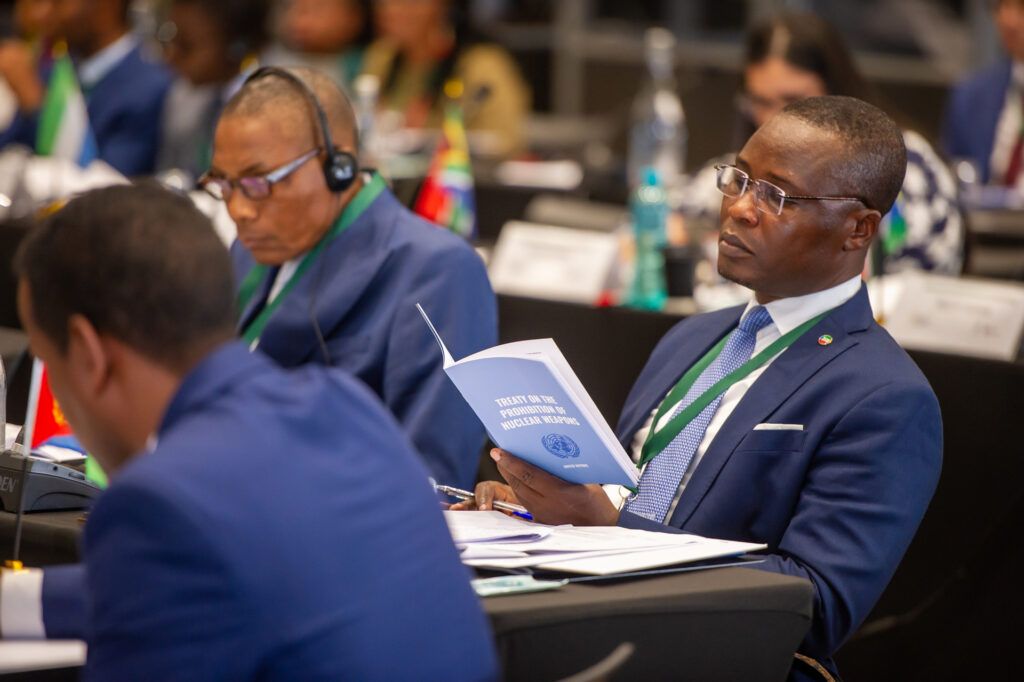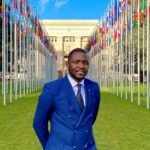How passport privilege undermines the nuclear ban treaty
By Olamide Samuel | December 21, 2023
 A delegate from Equatorial Guinea attends a seminar on universalization of the Treaty on the Prohibition of Nuclear Weapons (TPNW) in Pretoria, South Africa, on January 30, 2023. Photo by Cornel van Heerden / ICAN.
A delegate from Equatorial Guinea attends a seminar on universalization of the Treaty on the Prohibition of Nuclear Weapons (TPNW) in Pretoria, South Africa, on January 30, 2023. Photo by Cornel van Heerden / ICAN.
Last month, hundreds of diplomats and international advocates for nuclear disarmament gathered in New York City to attend the second major meeting of states under the Treaty on the Prohibition of Nuclear Weapons, or TPNW. Among those present were representatives of more than a hundred civil society organizations that help guide state deliberations.
The treaty was made possible largely due to leadership of non-nuclear weapons states from the Global South and activism by organizations like the International Campaign to Abolish Nuclear Weapons (ICAN)—which won the 2017 Nobel Peace Prize for its work on the treaty. But an analysis of participation at the New York meeting points to troubling inequities that favor organizations from Europe, Japan, and North America, and raises important questions about how global governance mechanisms spearheaded by civil society can succeed as they become institutionalized.
Civil society rising, but missing the mark. Historically, the states most directly impacted by nuclear weapons have had the least influence in deciding how to govern them. Lower-income countries tend to be more adversely affected by the impact of indiscriminate weapons, but the lower a country’s income, the less likely it is to participate in forums key to disarmament diplomacy. This is particularly true for countries that endured explosive nuclear weapons tests, like those in the Pacific and North Africa.
Promisingly, this year’s TPNW meeting in New York, held from November 27 to December 1, saw an overall increase in state participation compared with the first meeting in Vienna in 2022, particularly by countries in the Global South. It’s an indicator of the treaty’s growing importance in diplomatic discussions of nuclear disarmament, and a positive step toward the treaty’s ultimate goal of universality: to achieve global nuclear prohibition, every country in the world must sign on.
Likewise, civil society engagement with the TPNW remains crucial for the treaty’s progress. States highlight the scientific and technical knowledge that civil society provides them, often through working papers, and their role presenting invaluable testimonies of victims and survivors from communities affected by nuclear weapons—including those inadequately represented by their own governments. (Japan is a case in point: although it is the only country that has been attacked by nuclear weapons in war, it is not a state party to the TPNW, and its government refuses to attend meetings even as an observer. Japanese civil society groups, on the other hand, sent 79 delegates to last month’s conference in New York.) At last year’s event in Vienna, there were 589 delegates from civil society (of which I was one). There were at least 703 present this year. At both meetings, the number of civil society delegates dwarfed the number of state delegates.
But a closer look at the composition of that civil society attendance reveals a striking lack of geographic diversity, reflective of nuclear disarmament forums as a whole. On average, a lopsided 86 percent of civil society actors present at the TPNW meetings were there on behalf of organizations headquartered in North America, Europe and Japan. This stands in stark contrast to the fact that 91 percent of countries signed on to the treaty are in the Global South.
This lack of civil society diversity has a discernible impact on the issues actually raised within the treaty workings and debates, and on whose perspectives are heard. The effect is measurable in the proportional lack of geographic diversity of working papers submitted to the meeting. At the first meeting, where 11 percent of civil society organizations were from the Global South, only 11 percent of working papers originated there; at this year’s meeting, where civil society attendance from the Global South improved somewhat to 17 percent, the corresponding number of papers submitted still only reached 15 percent.
Overcoming barriers to entry. Hosting this year’s meeting in New York City appears to have improved participation of state delegations. Since New York is home to the UN headquarters which houses the General Assembly, most countries, including those from the Global South, have sizable permanent missions there that are well-versed on disarmament issues.
But looking at non-governmental organizations at these same nuclear forums, it is clear that those based in North America, Europe and Japan have privileged access; they are exempt from costly and time-intensive visa restrictions on visiting diplomatic capitals like Geneva, Vienna and New York. To attend nuclear conferences in Switzerland or Austria, their delegates merely require a valid passport, and they can freely remain in diplomatic capitals for 90 days at a time. The United States has slightly more stringent conditions, but with a valid passport and payment of a $21 fee, they are guaranteed a visa waiver through the Electronic System for Travel Authorization in under 48 hours.
The visa process is very different for the TPNW’s 37 lower-income member states, and for civil society delegates from lower-income states. To attend events in Geneva, Vienna, and New York, these citizens must provide:
- extensive documentation of income (including months of bank statements and paystubs);
- personal information (including information about relatives);
- biometric information;
- invitation letters or sponsorship letters (not offered by the UN);
- and pre-booked return flight and accommodation details.
The United States goes a step further, requesting information like all social media handles, email accounts, and phone numbers owned by the applicant during the past five years. The US visa application fee for citizens from most lower-income countries is $185—nearly nine times more expensive.
And all of that is just to knock on the door. Next, officials make a political determination on whether the privilege of entry should be granted. For European countries, it is not uncommon for nuclear disarmament activists to be denied simply because the host country has “reasonable doubts” about the person’s intention to leave the country once the meeting has ended.
The time sunk into this application process is also daunting. US visa application times for most African and South American civil society delegates is upwards of 270 days. In Nigeria, (the largest TPNW state party by population), US visa waiting times average 664 days in the capital, Abuja, and 430 days in Lagos, its largest city.
On December 1, it was decided that the TPNW’s third meeting of states parties will take place again in New York, on March 3, 2025. That’s 458 days for prospective delegates from places like Tijuana, Nuevo Laredo, Guatemala City, or Abuja to secure a visa to attend. With current US wait times, they simply won’t have enough time. Given this reality, it’s not surprising that many from the developing world are summarily discouraged from participating in nuclear policy forums.
Civil society organizations from the Global North are not indifferent to the issue of inequitable representation, and some international coalitions headquartered in developed countries help fund participation of developing country delegations. In many cases, these coalitions also stand as guarantors for delegates who need visa sponsorship. But there are limits to these non-profit organization’s financial and political leverage. While ICAN was able to sponsor 248 delegates at the Vienna meeting, this number dwindled to 63 in New York.

Some recommendations. The inequitable visa system is one of the chief barriers to Global South participation in disarmament efforts, but it is certainly not the only one. TPNW state members should consider holding their 2025 meeting at an appropriate location in the Global South instead of the usual US and European venues. They should also consider expanding existing sponsorship programs to representatives from Least Developed Countries and Small Island Developing States (like those that suffered Cold War nuclear tests).
Lastly, the UN secretariat’s accreditation process is out of sync with host countries’ visa regimes. For this year’s meeting in New York, the secretariat did not conclude the accreditation process until November 17, 2023—just ten days before the meeting began. For many, confirmation of accreditation serves as the sole evidence for visa application processes, which, as seen above, take considerably longer than ten days. The UN should implement accreditation procedures more efficiently, and consider issuing invitation letters to accredited participants to support their visa applications.
As the TPNW welcomes new state members and becomes more institutionalized, it is increasingly absurd that the majority of civil society advocates are not representative of the publics they, and the treaty, draw legitimacy from. While equal representation does not automatically ensure all perspectives are heard equally, diversified participation is essential for the treaty processes to be effective. Nuclear disarmament is not an ambition exclusive to citizens from the Global North, nor to officials from the Global South with diplomatic passports.
Together, we make the world safer.
The Bulletin elevates expert voices above the noise. But as an independent nonprofit organization, our operations depend on the support of readers like you. Help us continue to deliver quality journalism that holds leaders accountable. Your support of our work at any level is important. In return, we promise our coverage will be understandable, influential, vigilant, solution-oriented, and fair-minded. Together we can make a difference.
Keywords: Nuclear Injustice, TPNW, Treaty on the Prohibition of Nuclear Weapons, civil society, global south
Topics: Nuclear Weapons















